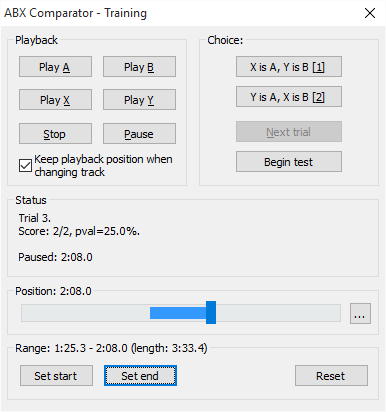JSmith
Master Contributor
It depends... are you being transparent with these comments?We done now?
JSmith
It depends... are you being transparent with these comments?We done now?
Faff.It depends... are you being transparent with these comments?
JSmith
Well, to be honest: A trained listener like Amir-senpai can hear A LOT more than I could ever dream of.To distinguish it between any other DAC. I haven't heard a difference in any of them that I can reliably tell (except one, but I'm to believe it was probably defective).
I'd rephrase that: Good measurements get the gear out of the way.The real dividing line is whether one thinks the measurements get you most of the way.
My girlfriend won't even watch a LOTR movie in one sitting with me, she definitely won't switch tracks for two hours.B-I-N-G-O was his name-o. You need a partner in crime that can switch it. And to make sure that's random, she should flip a coin to determine whether it's A or B. Straight preference. on your part. Well really, that's not entirely fair--what if it sounds better on some material and not others? You should unequivocally state which it is. I mean you'll know right?

What is a faff?
Thank you for your contribution.I have done some new testing and you are ALL wrong. Wrong about everything. I bought some new speakers from a guy in the Walmart parking lot (White Van)and they were "Blemish" items of extremely high end speakers. The seller promised me that I was getting a super deal on them. So I took my new Wilson speakers home after paying $100 for the pair and like he said, the only Blemish on them was the name piece that said Wildon instead of Wilson. I plugged them in to my 5 watt tube amp system and OMG, the music! It was amazing. This showed me that there is no reason for any of this silly objectivist testing. My ears told me all I wanted to know. I saved over $30,000 on those speakers. I'm so glad he didn't sell out of them before I got to Walmart. I never thought I would win the parking lot lotto like that. What a lucky day!
This is a funny site to spend time on if one is "not interested in the scientific study of audio"... irrespective of how much one's earbuds cost -- or how good, or bad, they might be, objectively or subjectively, quantitatively or qualitatively.I don't care how gear measures if it sounds good, but that doesn't mean I'm not interested in the scientific study of audio. I didn't know that me enjoying listening to my $5 earbuds out of my Pixel 4 on my commute to the grocery store precludes my participation here. That seems unnecessarily elitist to suggest that I may enjoy listening to audio and also not want to understand more about it?
You don't need a weatherman to know which way the wind blows.
Another of the Zim's great utterances: "YOU'RE A LIAR!!"This is a funny site to spend time on if one is "not interested in the scientific study of audio"... irrespective of how much one's earbuds cost -- or how good, or bad, they might be, objectively or subjectively, quantitatively or qualitatively.
I certainly, personally, have interest in both the left-brain & the right-brain (so to speak) side of this hobby. That said, when it comes to this particular site (which I'll mention is called Audio Science Review... although it's really more akin to "Audio Engineering Review" from my perpsective as a "pro" scientist), I think Bobby Zimmerman's bon mot holds:
I disagree.There is a lot of research on expectation bias, and confirmation bias. The best inoculation for bias is knowledge.
Measurements = Knowledge
Anecdotal Reports != Knowledge
An important point. To which I'd add that it's just not practical. And it's horrible: the shops that sell high-performance gear cater to audiophile sensibilities and aesthetics, which I find repulsive. My own argument in favor of making best use of measurements is practical.I guess I lean objectivist, but I’m always surprised that search costs don’t come up in these discussions. The point is to come up with measurements that will produce a satisfying sound because it is difficult/expensive to listen to every combination of everything (Which appears to be the audiophile way - “try it with the cables elevated another inch and the amplifier on rubber pucks”).
That's too simple. I count myself as subjectivist and don't see why a music lover would want to be otherwise. I want equipment that lets me pursue my interest, music, with minimum distraction. Listening to the equipment is perverted, although I'm grateful to Amir for doing this distasteful chore for meSo it does seem to come down to the old saw - some people listen to the music using their equipment, (subjectivist) audiophiles use music to listen to their equipment.
I disagree.
Knowledge = Inference of facts
Measurements = Scientific fact
Anecdotal evidence = Factual claim based on subjective observation
Whether scientific evidence is superior to anecdotal evidence can also depend on the situation and individual question.
For example:
Question: Hifiman Sundara vs. DT 770 250 Ohm?
Answer 1: DT 770's FRC shows frequencies around 6,000Hz being exceedingly protrusive compared to the Harman Target.
Answer 2: The DT 770s have very sharp highs, better get the Sundaras.
Sometimes it's even just comprehensibility that decides.
Anecdotal evidence = Factual claim
Whether scientific evidence is superior to anecdotal evidence depends entirely on the situation and individual question.
I cannot see where this is going, nor whatever was the purpose from the very begining...Easy one:
objectivists are objectively right.
subjectivists are subjectively right.
Everyone is happy. Case settled.
